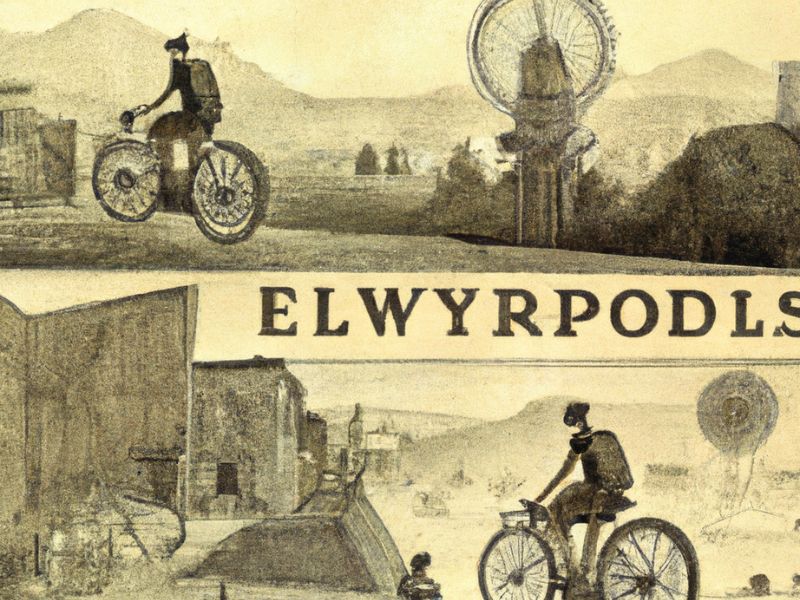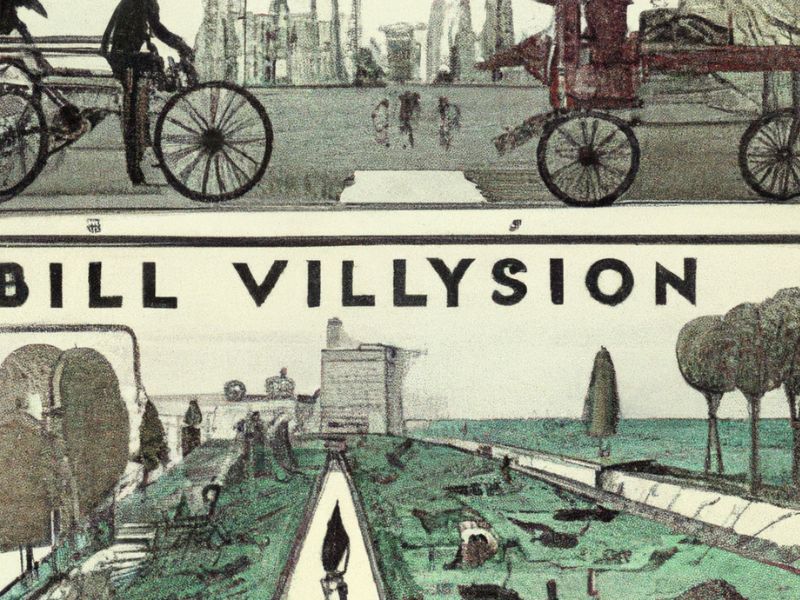Last Updated on 19 June 2024 by Cycloscope

How H.G. Wells’ passion for cycling influenced his life and visionary writing. His adventures + predictions in “A Modern Utopia,” and the profound impact of cycling and social perspectives on his famous work Wheels of Chance
H.G. Wells, the renowned British author famous for his groundbreaking science fiction works like “The War of the Worlds” and “The Time Machine,” had a lesser-known passion for cycling. This interest significantly influenced his life and writing, offering a unique lens through which he viewed the world.
Wells embraced cycling in the late 19th century, a period when bicycles were becoming increasingly popular in England. The bicycle represented freedom and adventure to Wells, allowing him to explore the English countryside and draw inspiration for his stories.
A Vision of Bicycle Paths: Predictions in “A Modern Utopia”

In 1904, Wells serialized a novel of alternate history titled “A Modern Utopia” in “The Fortnightly Review.” In this visionary work, he made bold predictions about the future, foreseeing the European Union, tarmac roads, the rise of suburbs, wind farms, dishwashers, tanks, motorways, sexual liberation, and even the internet with newspapers and mail being online. Among these futuristic ideas, Wells also described picturesque bicycle paths as an integral part of his utopian vision.
In Chapter Two of “A Modern Utopia,” Wells writes:
“Cycle tracks will abound in Utopia, sometimes following beside the great high roads, but oftener taking their own more agreeable line amidst woods and crops and pastures; and there will be a rich variety of footpaths and minor ways. There will be many footpaths in Utopia. There will be pleasant ways over the scented needles of the mountain pinewoods, primrose-strewn tracks amidst the budding thickets of the lower country, paths running beside rushing streams, paths across the wide spaces of the corn land, and, above all, paths through the flowery garden spaces amidst which the houses in the towns will stand. And everywhere about the world, on road and path, by sea and land, the happy holiday Utopians will go.”
This passage highlights Wells’ idealistic vision of a world where cycling and walking paths provide beautiful, serene routes for travel, integrating nature and urban life harmoniously.
One of Wells’ earlier novels, “The Wheels of Chance,” published in 1896, exemplifies his love for cycling. The story follows Hoopdriver, a draper’s assistant who embarks on a cycling holiday. Through Hoopdriver’s journey, Wells explores social mobility and the evolving middle class, using the bicycle as a symbol of personal freedom and societal change. This novel reflects Wells’ keen observations of his time, framed within the context of a cyclist’s adventure.
Wells’ enthusiasm for cycling also mirrored his fascination with technology and its societal impact. The bicycle, a relatively new invention in his youth, symbolized progress and innovation. This theme of technological advancement is prevalent in his works, where he imagines futuristic inventions and their effects on humanity. Just as the bicycle opened new possibilities for personal freedom, Wells’ stories explore the vast potential and risks of technological progress.
Cycling provided Wells with more than just inspiration for his writing; it offered a much-needed escape from his demanding writing schedule. The physical activity and meditative nature of cycling allowed him to relax and think through plot lines and ideas. Wells often rode with friends and colleagues, turning these outings into social events that were both enjoyable and intellectually stimulating.
Furthermore, Wells viewed cycling as a symbol of empowerment and social change. In an era of rigid class divisions, the bicycle offered a level of mobility and equality previously unattainable. This perspective resonated with Wells’ broader views on social reform and progress, themes that are evident throughout his work.
H.G. Wells’ passion for cycling is a fascinating aspect of his life that provides deeper insight into his worldview and creative process. His cycling adventures through the English countryside enriched his storytelling, offering readers a glimpse into the world as seen from the seat of a bicycle. This connection between his personal experiences and his visionary writing underscores the importance of simple hobbies in shaping profound professional achievements. The next time you read a Wells novel, remember that some of the greatest stories ever told might have started with a simple bike ride through the countryside.


